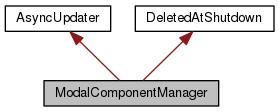Manages the system's stack of modal components.
More...
#include <juce_ModalComponentManager.h>
|
| class | Callback |
| | Receives callbacks when a modal component is dismissed. More...
|
| |
Manages the system's stack of modal components.
Normally you'll just use the Component methods to invoke modal states in components, and won't have to deal with this class directly, but this is the singleton object that's used internally to manage the stack.
- See also
- Component::enterModalState, Component::exitModalState, Component::isCurrentlyModal, Component::getCurrentlyModalComponent, Component::isCurrentlyBlockedByAnotherModalComponent
◆ ModalComponentManager()
| ModalComponentManager::ModalComponentManager |
( |
| ) |
|
|
protected |
Creates a ModalComponentManager.
You shouldn't ever call the constructor - it's a singleton, so use ModalComponentManager::getInstance()
◆ ~ModalComponentManager()
| ModalComponentManager::~ModalComponentManager |
( |
| ) |
|
|
protected |
◆ attachCallback()
| void ModalComponentManager::attachCallback |
( |
Component * |
component, |
|
|
Callback * |
callback |
|
) |
| |
Adds a new callback that will be called when the specified modal component is dismissed.
If the component is modal, then when it is dismissed, either by being hidden, or by calling Component::exitModalState(), then the Callback::modalStateFinished() method will be called.
Each component can have any number of callbacks associated with it, and this one is added to that list.
The object that is passed in will be deleted by the manager when it's no longer needed. If the given component is not currently modal, the callback object is deleted immediately and no action is taken.
◆ bringModalComponentsToFront()
| void ModalComponentManager::bringModalComponentsToFront |
( |
bool |
topOneShouldGrabFocus = true | ) |
|
Brings any modal components to the front.
◆ cancelAllModalComponents()
| bool ModalComponentManager::cancelAllModalComponents |
( |
| ) |
|
Calls exitModalState (0) on any components that are currently modal.
- Returns
- true if any components were modal; false if nothing needed cancelling
◆ cancelPendingUpdate()
| void AsyncUpdater::cancelPendingUpdate |
( |
| ) |
|
|
noexceptinherited |
This will stop any pending updates from happening.
If called after triggerAsyncUpdate() and before the handleAsyncUpdate() callback happens, this will cancel the handleAsyncUpdate() callback.
Note that this method simply cancels the next callback - if a callback is already in progress on a different thread, this won't block until the callback finishes, so there's no guarantee that the callback isn't still running when the method returns.
◆ deleteAll()
| static void DeletedAtShutdown::deleteAll |
( |
| ) |
|
|
staticinherited |
Deletes all extant objects.
This shouldn't be used by applications, as it's called automatically in the shutdown code of the JUCEApplicationBase class.
◆ endModal() [1/2]
| void ModalComponentManager::endModal |
( |
Component * |
, |
|
|
int |
returnValue |
|
) |
| |
|
private |
◆ endModal() [2/2]
| void ModalComponentManager::endModal |
( |
Component * |
| ) |
|
|
private |
◆ getModalComponent()
| Component* ModalComponentManager::getModalComponent |
( |
int |
index | ) |
const |
Returns one of the components being shown modally.
An index of 0 is the most recently-shown, topmost component.
◆ handleAsyncUpdate()
| void ModalComponentManager::handleAsyncUpdate |
( |
| ) |
|
|
overrideprotectedvirtual |
◆ handleUpdateNowIfNeeded()
| void AsyncUpdater::handleUpdateNowIfNeeded |
( |
| ) |
|
|
inherited |
If an update has been triggered and is pending, this will invoke it synchronously.
Use this as a kind of "flush" operation - if an update is pending, the handleAsyncUpdate() method will be called immediately; if no update is pending, then nothing will be done.
Because this may invoke the callback, this method must only be called on the main event thread.
◆ isFrontModalComponent()
| bool ModalComponentManager::isFrontModalComponent |
( |
Component * |
component | ) |
const |
Returns true if the specified component is currently the topmost modal component.
◆ isModal()
| bool ModalComponentManager::isModal |
( |
Component * |
component | ) |
const |
Returns true if the specified component is in a modal state.
◆ isUpdatePending()
| bool AsyncUpdater::isUpdatePending |
( |
| ) |
const |
|
noexceptinherited |
Returns true if there's an update callback in the pipeline.
◆ juce_DeclareSingleton_SingleThreaded_Minimal()
Returns the number of components currently being shown modally.
- See also
- getModalComponent
◆ runEventLoopForCurrentComponent()
| int ModalComponentManager::runEventLoopForCurrentComponent |
( |
| ) |
|
Runs the event loop until the currently topmost modal component is dismissed, and returns the exit code for that component.
◆ startModal()
| void ModalComponentManager::startModal |
( |
Component * |
, |
|
|
bool |
autoDelete |
|
) |
| |
|
private |
◆ triggerAsyncUpdate()
| void AsyncUpdater::triggerAsyncUpdate |
( |
| ) |
|
|
inherited |
Causes the callback to be triggered at a later time.
This method returns immediately, having made sure that a callback to the handleAsyncUpdate() method will occur as soon as possible.
If an update callback is already pending but hasn't happened yet, calls to this method will be ignored.
It's thread-safe to call this method from any number of threads without needing to worry about locking.
◆ Component
◆ ContainerDeletePolicy< ModalItem >
◆ stack
| OwnedArray<ModalItem> ModalComponentManager::stack |
|
private |
The documentation for this class was generated from the following file:

